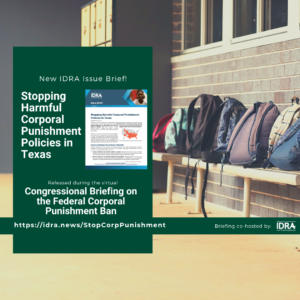• Morgan Craven, J.D. • IDRA Newsletter • June-July 2021 •


Federal Courts
Student Speech – In June, the U.S. Supreme Court issued an opinion in Mahoney Area School District v. B.L., to address whether a school district has the authority to punish off-campus student speech. The student, B.L., was suspended from her school’s cheerleading squad for a year for posting disparaging comments about the squad on her personal social media account. The posts were created during the weekend, off school grounds.
The Court found that the school violated B.L.’s First Amendment free speech rights when it suspended her. The Court confirmed that schools can regulate some off-campus student speech, including to address speech that disrupts the school or constitutes serious bullying, threats or harassment of teachers and students. However, outside of those circumstances (which will likely have to be judged by future courts), the free expression rights of students outweigh the school’s limited interests in regulating off-campus speech.
Transgender Student Rights – The U.S. Supreme Court declined to hear an education-related case brought by a transgender student who was prohibited from using the school bathroom that aligned with his gender identity. By denying the petition for a hearing in Gloucester County School Board v. Grimm, the Court allowed the 4th Circuit Court of Appeals’ decision to stand, which ruled that the Virginia school board’s policy requiring transgender students to use the bathroom that matches the gender they were assigned at birth violates federal law.
Protections for DACA Recipients – In mid-July, a U.S. district court judge ruled that DACA (Deferred Action for Childhood Arrivals policy) is unlawful. The decision allows DACA to remain in place for current recipients, who can continue to renew their DACA applications but instructed the U.S. Department of Homeland Security to develop a new policy that would protect the hundreds of thousands of undocumented young people who came to the U.S. as children. The decision underscores the need for comprehensive federal immigration policies and other protections for immigrant students and their families (see IDRA, 2021).
U.S. Department of Education
The U.S. Congress passed three COVID-19 relief bills that allocate billions of dollars to schools across the country. To ensure those funds are distributed equitably and to respond to states’ potential misuse of funds or requests for clarification on how funds can be used, the U.S. Department of Education issued a number of guidance documents. The resources are designed to instruct education agencies and schools on how to use federal relief funds to support students during and after the pandemic (see https://www.ed.gov/coronavirus).
U.S. Congress


The Counseling Not Criminalization in Schools Act, by Sen. Murphy, et al., would prohibit schools from using federal funding to maintain school policing programs and would create a grant program to support the hiring and training of counselors, social workers and other important school staff. IDRA offers resources online to assist school districts that choose to invest in strategies that create safe and supportive schools for all students and move away from school policing and other harmful approaches (www.idra.org/education_policy/school-policing-resources).
These two federal bills would be a critical step in ending the school-to-prison and school-to-deportation pipelines.
Resources
IDRA. (July 16, 2021). Today’s DACA Ruling Reaffirms Urgency for Congress to Pave Pathway for Citizenship – IDRA Statement on DACA Ruling. San Antonio: IDRA.
U.S. Department of Education. (2021). COVID-19 Resources for Schools, Students, and Families, website. Washington, D.C.
Morgan Craven, J.D., is the IDRA National Director of Policy. Comments and questions may be directed to her via email at morgan.craven@idra.org.
[©2021, IDRA. This article originally appeared in the June-July 2021 IDRA Newsletter by the Intercultural Development Research Association. Permission to reproduce this article is granted provided the article is reprinted in its entirety and proper credit is given to IDRA and the author.]


